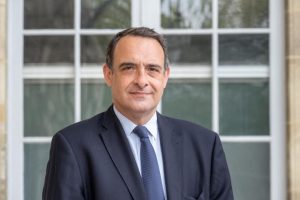Hiroshima Summit 2023: Interview with Philippe Setton, France Ambassador to Japan―Looking forward to deliberations on nuclear disarmament
Dec. 14, 2022
Under current circumstances, nuclear deterrence is essential
by Michiko Tanaka, Senior Staff Writer
France Ambassador to Japan Philippe Setton responded to questions from the Chugoku Shimbun in a written interview, ahead of the summit meeting of the G7 (attended by the Group of Seven industrialized nations), to be held in Hiroshima in May 2023. In his responses, he expressed his hope for deliberations to take place on nuclear disarmament, but also emphasized his view that nuclear deterrence is essential to global stability under current circumstances, given the inherently unstable international situation.
What are your thoughts about the upcoming G7 summit meeting scheduled to be held in Hiroshima City? I had the opportunity to attend the peace ceremony in Hiroshima this year, 2022, on August 6. I was struck by the strength and serenity of the Hiroshima Peace Memorial Park and the Atomic Bomb Dome. The city has turned its tragic fate into a vibrant call for world peace. It is also a city that has succeeded admirably in its reconstruction and is today resolutely turned toward the future even if it forgets nothing of its past. There is a strong educational dimension to visiting Hiroshima.
I believe that holding the G7 summit in this city that has suffered so much from the horrors of war is highly symbolic given the current situation, as the G7 partners strive to provide their full support to Ukraine, which is the victim of a brutal war of aggression.
How do you perceive Russia’s continued threats of nuclear weapons’ use?
Mr. Putin’s dangerous and irresponsible nuclear rhetoric is at odds with the joint statement that Russia signed alongside France, the United Kingdom, the United States, and China last January, in which all countries affirmed that “a nuclear war cannot be won and must never be fought.” As for France, we adhere to this responsible position and call for all other countries possessing nuclear weapons to also behave responsibly.
Do you agree with the idea of “a world free of nuclear weapons”?
France agrees with such an objective within the framework of the Nuclear Non-Proliferation Treaty (NPT). France has already made great strides by reducing our nuclear arsenal, declaring a moratorium on the production of missile material used for nuclear weapons, dismantling our facilities for production of such material, and signing the Comprehensive Nuclear Test Ban Treaty (CTBT). Nuclear disarmament is an important issue to deal with in order to move closer to the goal of achieving world peace. We expect all the other nations possessing nuclear weapons to work responsibly and transparently toward that goal.
A world free of nuclear weapons is a long-term goal to which France subscribes, but we should be realistic in the way we work toward achieving this goal. France considers that its moral objective cannot be the disarming of democracies when other autocratic powers continue to possess and develop nuclear weapons. A unilateral disarmament would expose France and its partners to violence and nuclear blackmail by our enemies while forcing us to rely on others to ensure our own security, which is frankly unacceptable. In this context, we remain convinced that nuclear deterrence for purely defensive ends remains an essential component of the world’s security and stability, especially given the current situation surrounding North Korea, the Taiwan Strait, and Ukraine.
What kinds of deliberations do you anticipate will take place at the G7 Hiroshima Summit meeting? Japan’s prime minister made it clear that the issue of nuclear disarmament will be discussed during the upcoming G7 summit meeting. We look forward to those exchanges with our partners. May I also say that other issues are important for international stability such as economic security, the fight against climate change, global health, and coordination to defend a rules-based international order.
I think that the issue of financing of development should be addressed at the upcoming summit. To do so, we will have to discuss substantive issues to mobilize more private-sector financing, in particular financing for the energy transition and the fight against climate change. The G7 will also have to achieve results regarding food security. Energy will also be an important topic of discussion. (Photo: ©Jonathan Sarago / MEAE)
Profile
Philippe Setton
Born in Paris in 1966, Mr. Setton joined France’s Ministry of Foreign Affairs in 1994. He served as Ambassador and Representative of France to the Political and Security Committee of the European Union (EU), European Union Directorate, Ministry of Foreign Affairs, among other positions, and has served in his current post since October 2020.
(Originally published on December 14, 2022)








